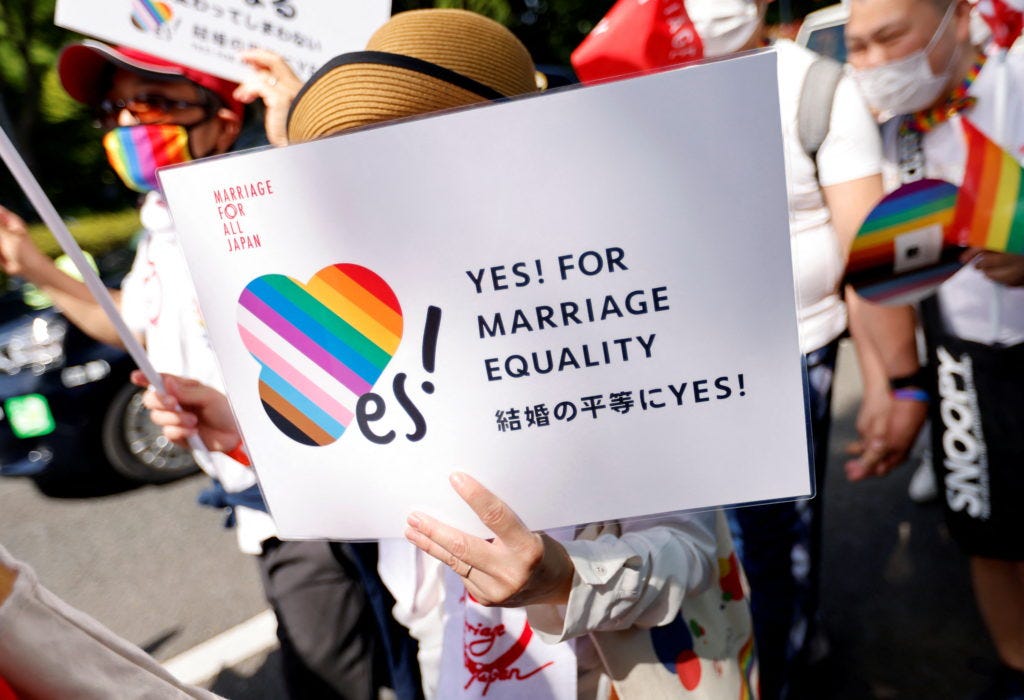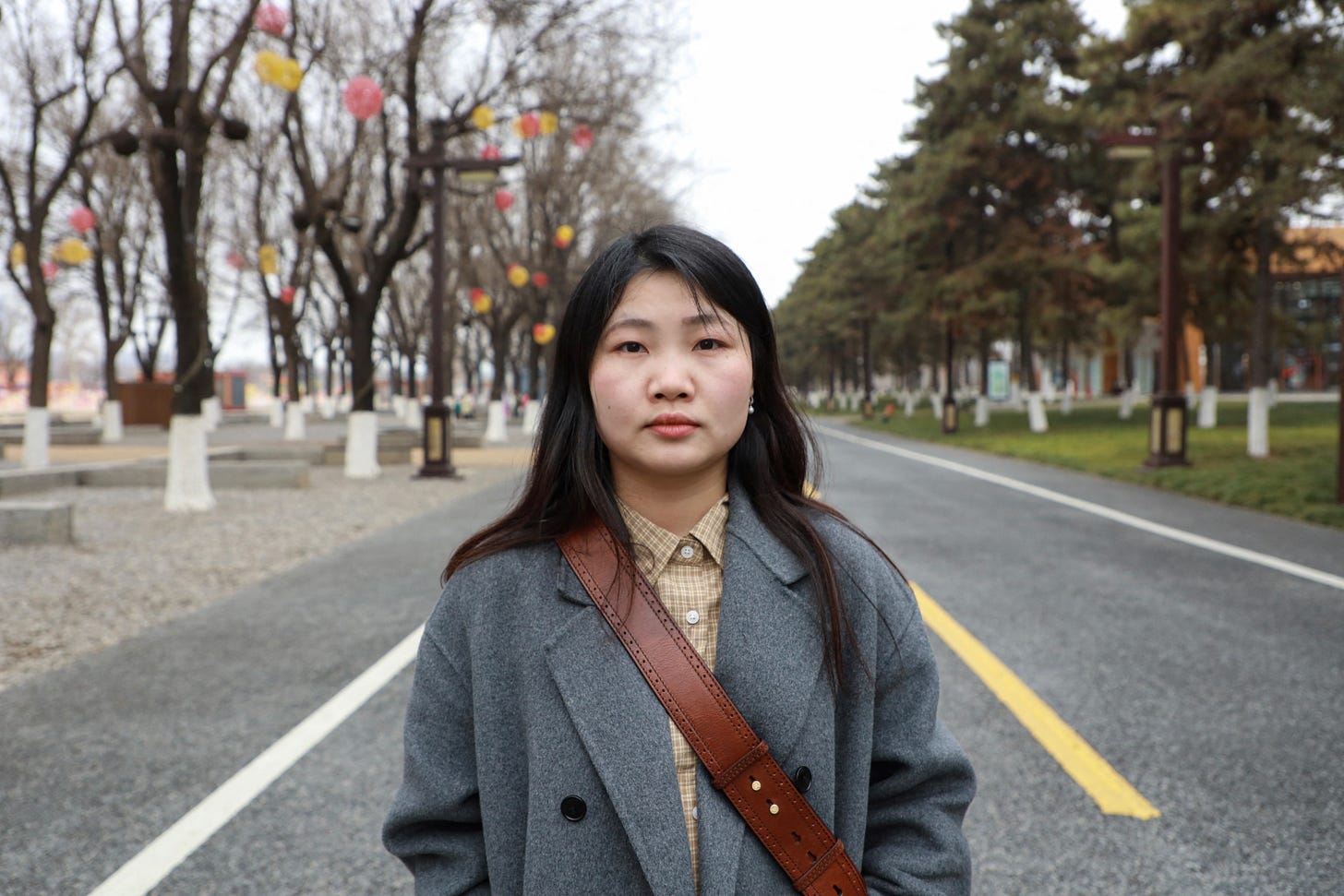Global Roundup: Pregnant Women & Survivors in Haiti, Bolivia Indigenous Woman Lawyer, Japan LGBTQ+ Rights, Chinese Feminists, Queer Palestinians on Ramadan
Curated by FG Contributor Samiha Hossain
Haitians march in Port-au-Prince on April 3, 2021 to commemorate the national day of the Haitian women’s movement — AFP photo
Last Friday, the UN Integrated Office in Haiti (BINUH) said nearly 450 pregnant women could suffer “life-threatening” complications without access to healthcare. Another 521 survivors of sexual violence — a prevalent problem that has worsened amid the instability in Haiti — also could be cut off from medical services by the end of the month if the violence persists, the UN office warned.
Today, too many women and young women in Haiti are victims of indiscriminate violence committed by armed gangs. -Ulrika Richardson, BINUH’s deputy special representative
Widespread gang violence has plagued Haiti for nearly three years, particularly after the assassination of President Jovenel Moise in July 2021 deepened political instability in the Caribbean nation. The crisis worsened last weekend when gunmen overwhelmed the main penitentiary in Port-au-Prince and another nearby prison, freeing thousands of inmates in a raid that left several people dead.
Abortion in Haiti remains illegal, and hospitals have warned of staff, bed and blood shortages while many aid organizations have suspended services due to the violence. BINUH chief Maria Isabel Salvador said it was "imperative" to promote the participation of women in leadership across Haiti including at the political levels.
Bolivian Aymara indigenous lawyer Bertha Aguilar is currently handling 40 cases, from women in divorce proceedings to property conflicts -- all in her local Aymara language (Aizar RALDES)
Bolivian Aymara indigenous lawyer Bertha Aguilar is currently handling 40 cases, from women in divorce proceedings to property conflicts – all in her local Aymara language. The 56-year-old mother-of-two is one of the rare lawyers in Bolivia who represents women who only speak Aymara, the country's third most-used language after Spanish and Quechua.
It's different when you speak to them in Aymara, they are better able to tell you what happened to them. - Bertha Aguilar
The Aymara represent 9.6 percent of Bolivians. And although the country counts 36 recognized languages, court proceedings are only held in Spanish and there is no obligation to provide an interpreter. For the 41 percent of the population who identify as Indigenous, some of whom speak only their mother tongue, this is a barrier to justice.
We would like to know how many judges and prosecutors speak an Indigenous language….If the Aymara do not understand Spanish, they have greater difficulty understanding the complexity of a judicial process that is in Spanish. -Lucia Vargas of the Women's Coordinator group of feminist NGOs
Aguilar proudly dons the traditional shawl, hat, and pollera – a long woolen skirt – worn by Aymara women, even when she is in court. Most of her clients are women, many seeking her counsel after experiencing a wide range of gender-based violence. She decided to become an attorney after experiencing stigma and discrimination at home and within the legal system. She suffered physical violence and economic abuse at the hands of her ex-husband who used derogatory terms aimed at Indigenous women. They separated in 2005, but it was a struggle to find a lawyer who would handle her divorce. She said she spoke to "about four, but I couldn't make myself clear... and they defended the man."
In 2023, Bolivia registered 51,000 complaints of physical, sexual, psychological and economic abuse against women. The cases include 81 femicides, according to data from the prosecutor's office.
Now, Aguilar has a small office in front of the El Alto Court of Justice, with a sign outside reading: "If I am not in, call." When she is not litigating, she tends to her small farm in Chachapoya, but she never rejects an incoming call. Aguilar has the same message for all of her clients: "If I escaped the abuse... why can't you?”
A participant holds a sign as they march during the Tokyo Rainbow Pride parade, celebrating advances in LGBTQ rights and calling for marriage equality, in Tokyo, Japan April 23, 2023. Photo by Issei Kato/Reuters
A Japanese high court ruled Thursday that denying same-sex marriage is unconstitutional and called for urgent government action to address the lack of any law allowing for such unions. Plaintiffs and the LGBTQ+ community in Japan cheered it as a landmark decision that gives them hope for change toward equality.
The court does not have the power to overturn the current marriage law, which has been interpreted to restrict marriage as between a man and a woman. Government offices may continue to deny marriage status to same-sex couples unless the existing law is revised to include LGBTQ+ couples or a new law is enacted that allows for other types of unions.
The Sapporo High Court ruling said that not allowing same-sex couples to marry and enjoy the same benefits as straight couples violates their fundamental right to equality and freedom of marriage. The case was brought by three same-sex couples who appealed three years ago after a lower court recognized the unconstitutionality of excluding same-sex couples from marriage equality but dismissed compensation claims for their suffering. A lower court issued a similar ruling on Thursday, becoming the sixth district court to do so. But the Tokyo District Court ruling was only a partial victory for Japan’s LGBTQ+ community calling for equal marriage rights, as it doesn’t change or overturn the current civil union law that the government says defines marriage as between a man and a woman.
A plaintiff, Eri Nakaya, said the traditional definition of marriage repeatedly made her feel that same-sex couples are treated as if they do not exist.
The ruling clearly stated that same-sex couples have the same right as others and deserve to live in this country, and reminded me it’s okay just to be me. - Eri Nakaya
Chief Cabinet Secretary Yoshimasa Hayashi told reporters that the government planned to closely watch the public opinion and parliamentary debate, as well as pending court cases because “an introduction of same-sex marriage closely affects family values of the people.” The eight Tokyo plaintiffs said they are frustrated by Japan’s slow change. A lawyer, Makiko Terahara, said they planned to appeal Thursday’s decision to a high court.
Chai Wanrou, 28, poses during an interview in Xian, Shaanxi province, China, March 1, 2024. REUTERS/Xiaoyu Yin
Regardless of whether you're extremely successful or just ordinary, women still make the biggest sacrifices at home. Many who got married in previous generations, especially women, sacrificed themselves and their career development, and didn't get the happy life they were promised. Living my own life well is difficult enough nowadays. - Chai Wanrou
Women are defying these social norms amid rising pressure from the government to increase the decreasing population and birth rate. President Xi Jinping last year stressed the need to "cultivate a new culture of marriage and childbearing" as China's population fell for a second consecutive year and new births reached historic lows.
Feminist activism is basically not allowed (in China), but refusing marriage and childbirth can be said to be ... a form of non-violent disobedience towards the patriarchal state. -Lü Pin, Chinese feminist activist based in the United States
Long-term single lifestyles are gradually becoming more widespread in China, giving rise to online communities of mostly single women who seek solidarity from like-minded people. Posts with the hashtags "No marriage, no children" from female influencers often in their thirties or forties on Xiaohongshu, China's Instagram, regularly gain thousands of likes. One anti-marriage forum on Douban, another social media platform, has 9,200 members, while another dedicated to "singleism" has 3,600 members who discuss collective retirement plans, among other topics.
Many of the women interviewed by Reuters cited a desire for self-exploration, disillusionment with patriarchal Chinese family dynamics and a lack of "enlightened" male partners as the main factors behind their decision to stay single and childfree. Gender equality also plays a role: all the women said it was difficult to find a man who valued their autonomy and believed in equal division of household labour.
Muslims walk next to the Dome of Rock Mosque at the Al-Aqsa Mosque compound in Jerusalem's Old City, Sunday, March 10, 2024. (Mahmoud Illean/ASSOCIATED PRESS)
Leila Shaban is not just fasting in the spirit of self-sacrifice this Ramadan; she says she’s fasting for a free Palestine. A queer Guatemalan and Palestinian vintage clothing authenticator based in Brooklyn, Shaban was raised religiously secular but feels drawn to explore Islam this Ramadan. Shaban, who recently protested a Human Rights Campaign (HRC) gala due to its weapons manufacturer sponsors, lost 15 family members in Gaza. This year marks her first Ramadan.
After witnessing the genocide these last 150+ days, my desire to learn and reclaim Islam for myself has been cemented. But it also feels daunting, there is so much to teach myself without external guidance, and there will be no external validation for the ways in which I adapt the religion to fit my progressive values and mixed cultural backgrounds—which could be seen as haram by conservative folks. -Leila Shaban
The main reason Shaban is fasting for the first time this Ramadan is to serve as an homage to her paternal family in Gaza, and for it to be a daily reminder to direct her resources towards mutual aid. Fasting is about focus, according to Rand, a Palestinian queer activist known to many online as @officialjakegyllenhalal. Ramadan for her does not have to look like fasting from food, because this month “forces me to look inward,” she explained. Rand, who was also an organizer alongside Shaban for the HRC protest, says that fasting can look like disengaging from capitalism.
While Muslims worldwide fast, Gazans grapple with worsening famine. At least 112 Palestinians were killed in a “Flour Massacre” last month while gathering desperately needed aid. For Zaina, a Brooklyn-based queer Palestinian with family in Gaza, this makes Ramadan bittersweet. She recently became a mother and her wife is preparing to give birth to their second child so she empathizes with the mothers in Gaza who struggle to provide food for their children or produce enough breast milk.
[This year,] I’m thinking of this Ramadan as the time to honestly give as much as I can to people in need, particularly people in Gaza, and I’m carrying the spirit of Zakat, which means basically giving to those less fortunate than you, with me through this Ramadan. -Zaina
Yaffa, executive director of Muslim Alliance for Sexual & Gender Diversity (MASGD), acknowledges that queer, trans, and nonbinary Palestinians may lack access to traditional spaces for Ramadan’s spiritual work. In this, however, is a silver lining—one that they believe LGBTQ Palestinians always manage to do.
We’re the most likely people to be building out our own spaces and actually doing the reflection work and really holding on to the realities of Ramadan. -Yaffa
Samiha Hossain (she/her) is an aspiring urban planner studying at Toronto Metropolitan University. Throughout the years, she has worked in nonprofits with survivors of sexual violence and youth. Samiha firmly believes in the power of connecting with people and listening to their stories to create solidarity and heal as a community. She loves learning about the diverse forms of feminist resistance around the world.






